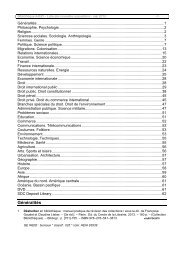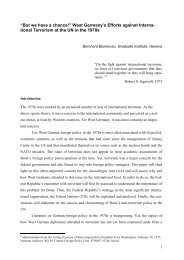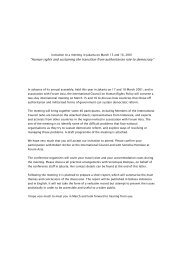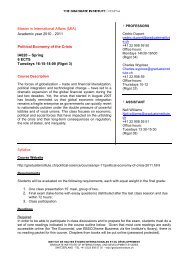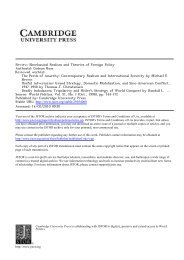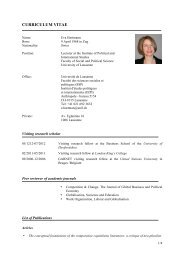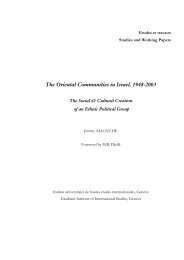Extending International Criminal Law beyond the Individual to ...
Extending International Criminal Law beyond the Individual to ...
Extending International Criminal Law beyond the Individual to ...
You also want an ePaper? Increase the reach of your titles
YUMPU automatically turns print PDFs into web optimized ePapers that Google loves.
<strong>Extending</strong> <strong>International</strong> <strong>Criminal</strong> <strong>Law</strong> 919<br />
develop which details <strong>the</strong> requisite mental engagement of a company before it<br />
can be said <strong>to</strong> have committed an international crime. For <strong>the</strong> moment <strong>the</strong> field<br />
is likely <strong>to</strong> develop according <strong>to</strong> those national jurisdictions which are among<br />
<strong>the</strong> first <strong>to</strong> try corporations for international crimes. Several arguments were<br />
raised above in favour of liability developing <strong>beyond</strong> <strong>the</strong> traditional need for a<br />
relevant individual perpetra<strong>to</strong>r, so that corporations could be found liable due<br />
<strong>to</strong> a failure in <strong>the</strong>ir systems. Perhaps <strong>the</strong> overwhelming argument in this vein<br />
is that: ‘Rules of liability should encourage management <strong>to</strong> have a preventive<br />
system.’ 58<br />
5. Emerging Practice Concerning Rebel Groups,<br />
Paramilitaries and Political Parties<br />
As already mentioned above, <strong>the</strong> ICC Statute did not, in <strong>the</strong> end, include jurisdiction<br />
over non-natural persons. The Working Group, that drafted various<br />
proposals, had in mind not only <strong>the</strong> prospect of prosecutions of corporate<br />
entities but also of political parties or even racist groups. Of course such a<br />
move was in part inspired by <strong>the</strong> fact that <strong>the</strong> <strong>International</strong> Military Tribunal<br />
in Nuremberg in 1946 had declared criminal certain organizations under its<br />
Statute; 59 and <strong>the</strong> move was partly rejected precisely because <strong>the</strong> declarations<br />
against <strong>the</strong> organizations had been used <strong>to</strong> prosecute individuals for membership<br />
of such groups. 60 According <strong>to</strong> Bassiouni: ‘To impose international criminal<br />
responsibility merely for passive membership in an organization stretches<br />
<strong>the</strong> generally accepted principles of criminal responsibility found in most legal<br />
systems. Such a proposition would be tantamount <strong>to</strong> guilt by association which<br />
most legal systems reject as fundamentally unfair.’ 61 Despite <strong>the</strong> absence of<br />
58 C. Wells, Corporations and <strong>Criminal</strong> Responsibility (2nd edn., Oxford: Oxford University Press,<br />
2001), 157.<br />
59 The IMT declared <strong>the</strong> following organization <strong>to</strong> be criminal under Art. 9 of its Statute: <strong>the</strong><br />
Leadership Corps of <strong>the</strong> Nazi Party, <strong>the</strong> Gestapo, SD, and <strong>the</strong> SS. According <strong>the</strong> James Owen:<br />
‘The French and Soviets had grave concerns about such corporate and retrospective declarations<br />
of guilt’. Owen refers <strong>to</strong> ‘an avalanche of affadavits ^ more than 190,000 of <strong>the</strong>m’. J. Owen,<br />
Nuremeberg:EvilonTrial(London: Headline Review, 2006), 13.<br />
60 See Arts 9 and 10 IMT Statute. It is worth noting <strong>the</strong> following passage from <strong>the</strong> Judgment:<br />
‘A criminal organisation is analogous <strong>to</strong> a criminal conspiracy in that <strong>the</strong> essence of both is<br />
cooperation for criminal purposes. There must be a group bound <strong>to</strong>ge<strong>the</strong>r and organized for a<br />
common purpose. The group must be formed or used in connection with <strong>the</strong> commission of<br />
crimes denounced by <strong>the</strong> Charter. Since <strong>the</strong> declaration with respect <strong>to</strong> <strong>the</strong> organisations and<br />
groups will, as has been pointed out, fix <strong>the</strong> criminality of its members, that definition should<br />
exclude persons who had no knowledge of <strong>the</strong> criminal purposes or acts of <strong>the</strong> organisation<br />
and those who were drafted by <strong>the</strong> State for membership, unless <strong>the</strong>y were personally implicated<br />
in <strong>the</strong> commission of acts declared criminal byArticle 6 of <strong>the</strong> Charter as members of <strong>the</strong><br />
organisation. Membership alone is not enough <strong>to</strong> come within <strong>the</strong> scope of <strong>the</strong>se declarations.’<br />
61 M.C. Bassiouni (ed.), <strong>International</strong> <strong>Criminal</strong> <strong>Law</strong>. Volume 1: Crimes (2nd edn., Ardsley:<br />
Transnational, 1999), 24. For detail on some of <strong>the</strong> proposed legislation being developed in<br />
order <strong>to</strong> criminalize membership of certain terrorist groups listed by <strong>the</strong> United Nations and<br />
<strong>the</strong> European Union, see A. Bianchi, ‘Security Council’s Anti-terror Resolutions and <strong>the</strong>ir



![Download [pdf] - The Graduate Institute, Geneva](https://img.yumpu.com/23370020/1/190x248/download-pdf-the-graduate-institute-geneva.jpg?quality=85)
